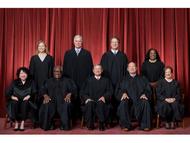Anti-Lawfare Lawfare - ORIGINAL CONTENT
- By:
- Edward A. Reid Jr.
- Posted On:
- Aug 25, 2025 at 6:00 AM
- Category
- Energy Policy, Climate Change
Lawfare has been a very popular approach for political jurisdictions seeking a “Jerry Maguire Moment” at the expense of the fossil energy industries. The most notorious of these lawfare efforts are the numerous “Exxon Knew” lawsuits, which allege that Exxon “knew” 30 years ago what the IPCC acknowledges it does not “know” today regarding the purported catastrophic effects of anthropogenic CO2 emissions.
More recently, California attempted to hold oil companies responsible for the Los Angeles fires, while New York and Vermont passed laws requiring massive payments as reparation for past damage. A group of 17 State Attorneys General have sued to have these laws declared unconstitutional.
Since President Trump’s re-election, numerous federal district judges have imposed nationwide injunctions to prevent a broad range of Trump initiatives, including climate change initiatives, from proceeding. The Trump Administration has appealed these injunctions with some success.
The US Supreme Court has been involved in the climate lawfare issue since 2007, when it determined that EPA could regulate CO2 as a pollutant under the Clean Air act, which became the basis for the 2009 EPA Endangerment Finding. EPA then developed the Clean Power Plan which regulated CO2 emissions from fossil fueled powerplants. The State of West Virginia sued EPA, arguing that EPA did not have the authority to regulate greenhouse gas emissions. The Supreme Court ruled in WV vs. EPA that EPA did not have that authority based on the “major issues doctrine”. This decision effectively the principle known as “Chevron deference” under which the Supreme Court had typically deferred to the decisions of the executive branch agencies.
The Supreme Court has since ruled that individual federal district judges do not have the authority to issue universal injunctions. This decision effectively ends what has been the major opposition tactic to block Trump initiatives to reverse Biden Administration policies in numerous areas including climate.
Many NGOs have conspired with executive branch agencies, especially EPA, using a technique referred to as “sue and settle”. These NGOs, which typically receive federal government funding, would sue EPA to cause or prevent a specific action, frequently at EPA’s request. EPA would then “negotiate” to settle the suit to the mutual satisfaction of the NGOs and EPA. The first Trump Administration ended “sue and settle”, but it was quickly restored by the Biden Administration. The current Trump Administration has again ended “sue and settle” and is aggressively fighting such lawsuits or countersuing.
NGOs have sued to force closure of coal generating stations with some success. However, the Administration declared an “Energy Emergency” in recognition of the rapid growth of electric demand, the premature closure of coal and natural gas generating stations and the declining capacity reserve margin on the nation’s electric grid. The Administration has been sued on the grounds that there is no energy emergency and therefore that planned coal plant closures should proceed.
US EPA is proceeding with a plan to vacate the 2009 EPA Endangerment Finding, which will likely trigger another round of climate lawfare which would be finally disposed by the Supreme Court.
“If the facts are against you, argue the law. If the law is against you, argue the facts. If the law and the facts are against you, pound the table and yell like hell”
- Carl Sandburg


